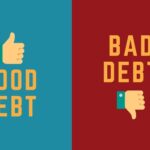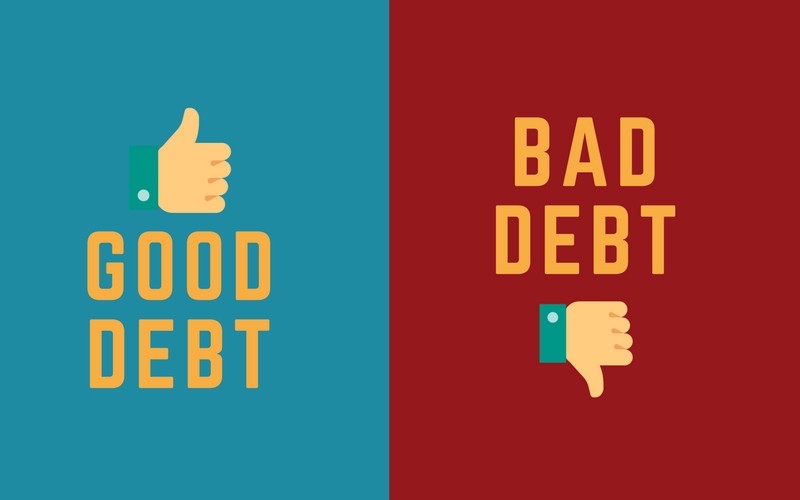Good Debt and Bad debt – 3 Key Differences
In the world of credit scoring, the types of debt you incur are treated very differently. Of course, your payment history matters a great deal regardless of the debt type. A late payment made on your mortgage loan may hurt your credit scores just as severely as a late payment made on a credit card account.
You are probably already well aware that on-time payments are the first key to earning good credit scores. Assuming that you have already established good payment habits the next step is to take a deeper look into how credit scoring models like FICO and VantageScore will treat the different types of debt appearing on your credit reports.
Good Debt and Bad Debt
Not all the loans are harmful. There may be loans that turn into investment and adds value to your wealth. For example, if you borrow a loan to buy a new home or jewelry, it will remain an asset for your lifetime. Only because people can not collect a huge amount to own that property do they go into debt. In this case, the loan is actually an investment. But, there are possibilities that good debt can turn bad anytime if the borrowers are not responsible for repaying the loans.
On the other hand. When the loan is just meant for luxurious expenditure you may not end up saving anything in the end. These debts are bad debts. If you keep on borrowing loans and spending them without proper repayments, that can put you into a debt crisis.
Differences Between Good Debt and Bad Debt
The purpose of credit scores (specifically the FICO score) is to predict the likelihood that a consumer will become 90 days late on any account within the next 24 months. Installment debts are simply less indicative of this future risk. For this reason, the balances on your installment debts will likely have a little negative impact on your credit scores whenever you open a new account. As a result, paying off installment debts probably will not do much to improve your credit scores.
| Good Debt | Bad Debt |
| Loans for investment purposes | Loans that are not meant for investments. |
| Loans that are used to buy things that add value. | Loans that are borrowed to spend without any savings. |
| Known as installment debt | Known as revolving debt |
| Example: Home Loan, Car Loan, Jewel Loan, Students Loan. | Example: Credit card, debts, high-interest loans. |
Installment Debt
From a credit scoring perspective, installment debt is considered to be “good” debt or, more accurately, debt that statistically represents less risk. Installment debts, such as auto loans and mortgages, are typically secured by an asset. Other installment debts like personal loans and student loans may not be secured, yet they still represent a lower level of risk to the lender for a variety of reasons.
credit card balance to limit ratios.
As you tap into more and more of your credit card limits your scores will slide further and further downward. Credit card debt itself can hurt your credit scores, even if you maintain a spotless payment history on your accounts. The good news, however, is that if you pay off your credit card debt your credit scores will generally rebound rather quickly.
Revolving Debt
The most common example of revolving debt can generally be found in your wallet. Credit card debt is considered to be bad debt from a financial perspective and it is considered bad debt from a credit scoring perspective as well.
When you revolve expensively, outstanding credit card debt from month to month you are both wasting money and harming your credit scores simultaneously. The amount of debt you carry, especially credit card debt, is highly predictive of your future risk. Because of this fact, credit scoring models pay close attention to your In the financial world all debt is certainly not created equal. There are good debts and there are bad debts. The generally accepted concept is that good debt includes those which work for you – investments that may grow in value. Conversely, bad debts are those which will depreciate. So what determines good debt and bad debt on your credit report?
If you have made the mistake of taking on too many debts then it is probably a smart idea to work toward eliminating those debts as quickly as possible. Yet before you decide which debts you plan to pay off first you should remember not to evaluate your debts solely from a financial perspective either. It is also important to consider how the different types of debts you carry may impact your credit. Good debt and bad debt don’t work the same on your credit report, and they’re not scored the same either!
Like it or not, your credit reports and scores have a tremendous influence on your life and your financial wellbeing. Ignoring the impact that paying off debt may have on your credit scores could turn into a costly blunder down the road.
The Bottom Line
Now that you understand how good debt and bad debt can impact your credit scores you can leverage that knowledge to your advantage. Working to get out of debt is almost always a great idea. Yet if you can create a plan to tackle your bad debts (aka credit cards) first then might just earn yourself a credit score boost sooner rather than later.
Frequently Asked Questions
What is the difference between good debt and bad debt?
Good debts are the loans people borrow for investing in other valuable resources. Loans that turn into investment and adds value to your wealth are good debt while the debts that are just used for expenses with no values are bad debt.
Why is credit card considered a bad debt?
Credit cards sometimes may drive people to spend on stuffs that aren’t necessary. This card may urge people to spend more than their needs and capabilities.
Do good debts affect my credit score?
Debts in general will bring down your credit score if not paid at the right time. But the good debts do not affect your credit as much as bad debts do.


